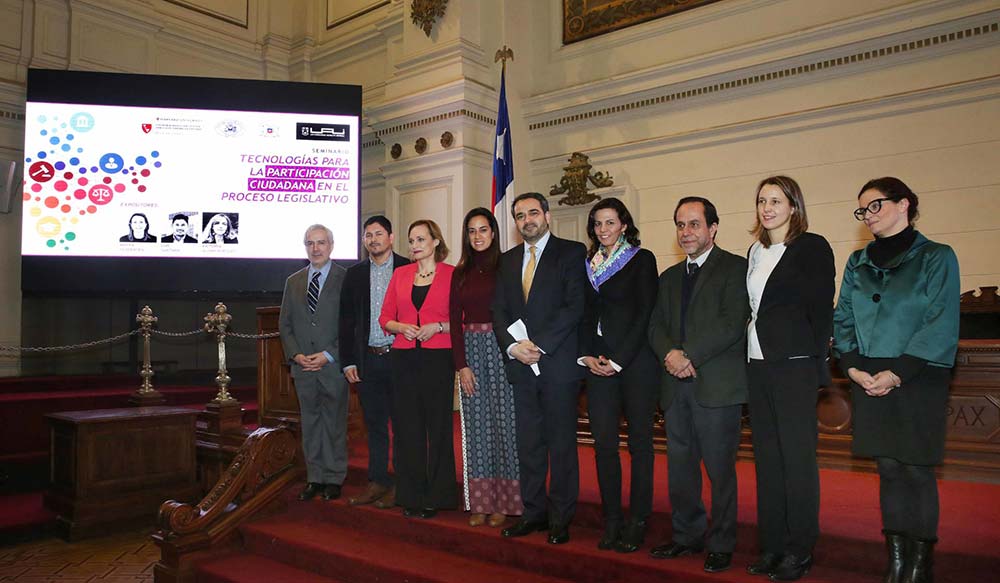
In different parts of the world, both governments and parliamentary systems face the challenge of increasing their levels of legitimacy and
Crowdlaw project
In different parts of the world, both governments and parliamentary systems face the challenge of increasing their levels of legitimacy and perception of trust. Various initiatives related to transparency and accountability are an alternative, but they have increasingly been trying to integrate and bring citizens closer to the very processes of law formation.
Based on this, the Crowdlaw project evaluates the interaction of citizens in the legislative and law formulation process
Through the use of technologies that contribute to improving the quality, effectiveness and legitimacy of the laws.
This study is developed by Universidad Adolfo Ibáñez and Harvard University with the support of the Harvard-UAI Collaborative Research Fund Program of the David Rockefeller Center for Latin American Studies Regional Office. Through an agreement with the Chilean Senate, it investigates 15 years of citizen participation on the Senador Virtual platform. In collaboration with the Department of Law Evaluation of the Chamber of Deputies, it investigates citizen participation in the final step of the laws’ preparation: their evaluation.
Crowdlaw: Technologies for Citizen Engagement
Preliminary Results
The first approaches to Senador Virtual show that there are more than 133,000 users of the platform from 2003 to 2018 and that the most voted projects in this period (over 10,000 interactions) are:
- Marijuana home growing for personal use (18,252)
- Abortion on 3 grounds (17,292)
- Animal accountability (11,823)
- Decriminalization of abortion in the indicated cases (10,270)
Study
Our research seeks to understand how the use of digital technologies for citizen engagement can improve law drafting and formulating processes at governance institutions through the interaction of their users, increasing their representativeness, effectiveness and efficiency. In the case of Senador Virtual, it involves studying the way in which this tool was designed, its use during its 15 years of operation, how users are involved, how the results are integrated into the process of discussing the law and how it has evolved. Regarding the Evaluation of the Law, it studies how citizens and experts are linked in this process in order to understand the impact on the formation and implementation of laws.
Study Implementation
The research involves generating qualitative data through standard and digital ethnography, semi-structured interviews and comments from the officials and users of Senador Virtual and the Department of Law Evaluation, as well as quantitative data collected from the use of the platform and facilitated by the Senate’s technology area. The data will be analyzed using a demographic and statistical approach, that is, a mixed research methodology (quantitative and qualitative) will be used.
Stages
Crowdlaw has two study phases. The first is a descriptive analysis to understand the characteristics, operation and impact of Senador Virtual and the processes of the Department of Law Evaluation. At this stage, the generation of data will be mainly qualitative, through interviews and observation. Then, we will look for patterns of participation among users through statistical, demographic analysis and other data tools in order to understand the characteristics of citizen engagement and the participation dynamics.
The final stage of the study includes an experimental section based on the evidence raised in the first period of the study and the selection of participants according to their relevance and representativeness.
For Senador Virtual, qualitative interviews with officials and former officials of the platform will be conducted, as well as ethnographic observations in Santiago and Valparaíso (where the Congress is located) to understand its operation, impact and user interactions. At the same time, in the Department of Law Evaluation of the Chamber of Deputies, we will study how citizen engagement is being incorporated into the technical evaluation process and evaluate whether it could be supplemented with participation through digital technologies.
Financing
The first and second stages of our study are financed by the Harvard-UAI Collaborative Research Fund Program and managed by the David Rockefeller Center for Latin American Studies.
Years of experience in projects improving people's quality of life
Review the rest of our projects
